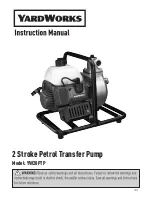
Applications Manual Bosch Geothermal Heat Pumps
| 7
Bosch Thermotechnology Corp.
Data subject to change
3 Residential Bosch Geothermal
Pump System Applications
The application of Bosch geothermal heat pump systems is
increasing rapidly in the residential sector. These systems
offer exceptional ef ciency because they use the relatively
constant temperature of the earth to heat and cool. Heat
removed from a residential structure during summer
months is collected and then rejected to the earth, then
stored for retrieval during the winter months. As the
earth's ground temperature is typically more moderate
than the outdoor air temperature, the annual energy
ef ciency is improved. In addition, the stored heat in the
earth can then be absorbed during winter months when
heating is required, and then used to heat the home. As
this heat comes from the ground, it can result in enhanced
savings in fossil fuel consumption and provide a reduction
in the emission of greenhouse gases, as well as other
pollutants.
Today, geothermal heat pump systems are referred to by
several different names. These include geothermal, earth-
coupled, geoexchange, groundwater, ground-coupled,
closed-loop, open-loop, and water-source heat pump
systems, just to mention a few. All geothermal heat pump
systems are an environmentally sound energy alternative.
And, geothermal heat pump systems are becoming more
“price-competitive” with conventional conditioning
systems.
A Bosch geothermal heat pump system (Fig. 1) will consist
of a Bosch geothermal heat pump coupled with a ground
heat exchanger to reject or add heat to the structure as
necessary. The ground heat exchanger may be a “Closed-
loop” system of buried HDPE piping, water pumped from a
groundwater well (”Open-loop” system), or a closed-loop
system in a large body of water. Other hybrid ground heat
exchanger methods also are available.
Fig. 1 Residential geothermal heat pump overview








































